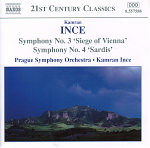Kamran Ince’s Symphony No. 4 “Sardis” (2000) is a suite of aural pictures portraying various sites throughout Turkey. The music ranges from descriptive travelog in the manner of Smetana’s Ma Vlast (with suitably ethnic-styled themes along the way) to atmospheric mood-setting à la Alan Hovhaness’ nature pieces. The result is a mildly pleasing if not particularly engaging musical experience.
There’s a more discernible symphonic/structural plan in Symphony No. 3 “Siege of Vienna”; the main material of the first movement (“Long March”) does reappear at the finale’s (“The Great Retreat”) conclusion. However much of the score sounds like a series of garish B-movie motifs (think of those diabolical-contraption scenes from any of John Barry’s 007 film scores) repeated ad nauseam. The odd-man-out here is the the seventh movement, “Victory”, which crassly borrows from Copland’s Billy the Kid. The remaining work, Domes, is a dreary drone indicating that in 1993 Ince had fallen under the pall of Glassian minimalism. Performance-wise the Prague Symphony Orchestra provides first-rate playing under the composer’s direction, but the cloudy and distant recording does not impress.
































